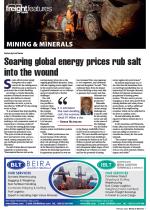Africa is on the cusp of unprecedented prosperity, but it needs to make use of the once-in-a-lifetime opportunity at present, created by the demand for critical minerals.So says Jose Fernandez, Under Secretary of State for Economic Growth, Energy, and the Environment at the US Department of State who said considering that there were not enough critical minerals to power the world’s demand, Africa’s rich mineral resources offered opportunity unlike any other.“Demand for most minerals essential to the clean energy transition will increase by a factor of four to six. For some minerals, the increase will be exponential. By 2040, graphite demand will increase by 25 times, and lithium by 42 times,” he said. “But today we have a problem. Simply put, not only do we not have enough critical minerals to power the world’s clean energy agenda, but our current supply chains for these minerals – from extraction to production to recycling – are simply not diverse enough for the energy future that’s coming. And I don’t need to remind you of what happens when the supply chain breaks down or when we depend on a single supplier. We lived it during the Covid pandemic, and this is a vulnerability that we need to solve together.”Opportunity and challengeFernandez said Africa had an abundance of the critical minerals needed, and acknowledged that the planet could not reach its energy transition goals without Africa. But, he said, while this was a massive opportunity, it also presented risk if countries could not deliver to world demand.The US, along with 11 other countries, Australia, Canada, Finland, France, Japan, the Republic of Korea, Norway, Sweden, the United Kingdom, and the European Union, in June last year launched the minerals security partnership (MSP) to address the shortage of critical minerals, looking at sharing information about potential projects, promoting investment and financing, adopting high ESG standards, and expanding offtake and recycling opportunities in critical minerals projects.According to Fernandez, the MSP has been working closely with several African countries to boost projects and drive investment.“During meetings with MSP partners, producing countries on the continent have emphasised their desire for investment in all stages of the critical minerals and battery materials value chains – not just mining, but also refining, battery production, and recycling. That makes all the sense in the world. We agree, and that’s why half of the projects the MSP is considering today involve varying levels of processing beyond extraction.”He said an example of this was the recent signing of a memorandum of understanding between the US and the DRC and Zambia to help them establish a new supply chain for EV batteries.Review of minerals projects“In addition, the US Export-Import Bank recently announced it will expedite the review of critical minerals projects under its ‘Transformational Exports Program’, which is funded for up to $27 billion through 2026,” he said. “We’ve also focused on enlisting our private sectors. During the United Nations General Assembly, Secretary Blinken highlighted the actions of a mine in Africa with a US and Australia nexus, which employs hundreds of local workers, contributes millions of dollars to community development, and undermines the aims of those who would sow conf lict. The Secretary’s example illustrates the spirit of the MSP and highlights our broader efforts.”He said the United States had been working to build capacity in the mining sector in 20 countries over the past decade and a half. “We have been training small-scale miners and other stakeholders in processing technologies that better protect them, their communities, and the environment from toxic pollution. In Africa, we are working with small-scale miners in the DRC, Ghana, and Mali to formalise the sector, introduce ESG standards, and remove toxic chemicals from the extractive process.”Looking at 200 projectsAccording to Fernandez, MSP partners have collectively looked at over 200 projects in the last quarter of 2022 alone. “We have winnowed that list down to about a dozen for further review and partner engagement. We are working with other allies and contributors on the enabling conditions – such as governance and transparency – that will make these projects more competitive. These proposals hit all stages of the supply chain, including smelting and recycling, and offer a different value proposition – one based on working in partnership with governments, local citizens, and other stakeholders.”

